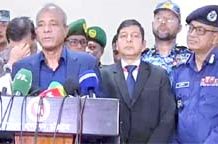C T Online Desk: The Met Office said on Monday that January, usually the coldest month of the winter season, might not record a severe cold wave.
A severe cold wave is a meteorological phenomenon in which the minimum temperature over a large area drops below 6C.
In January, severe cold is common, often more than once, while there are occasions when temperature falls below the 6C mark in December, the first winter month, meteorologists say.
But this year, no severe cold wave has been recorded so far, despite the monthly weather outlook for January forecasting two to three cold waves, one of them moderate, in the month.
‘We are clearly set to experience a warmer winter,’ senior meteorologist Abdul Mannan told New Age.
The Met Office data showed that the daily minimum temperature stayed mostly above 10C this winter, except for a very few days of a mild cold wave.
The lowest winter temperature of 8.4C so far has been recorded in the northern district of Naogaon on December 23.
The minimum temperature staying between 8C and 6C over a large area constitutes a moderate cold wave, which has not yet been seen this season.
The Met Office also said that the average daily maximum temperature in December was 1.2 C higher than usual while the average daily minimum temperature was 0.3C higher.
The average December temperature was 1C higher than usual, according to the Met Office.
This clearly warm winter put meteorologists in a rather difficult situation, for they became divided into two groups in producing the January forecast, officials at the BMD said.
Some of the meteorologists were in favour of including a severe wave forecast in the monthly weather outlook, but others found it unnecessary given the general trend of the temperature.
The meteorologists eventually agreed on the forecast that a severe cold wave was unlikely in January.
On Monday, the lowest daily minimum temperature of 9C was recorded in the early morning in Tetulia.
A mild cold wave was sweeping Panchagarh, Moulvibazar and Kurigram, and it was likely to continue, the Met Office said in its forecast until 6:00pm today.
In other parts of the country, the daily minimum temperature will range between 15C and 10C.
‘The next seven days are likely to feel more or less the same,’ said meteorologist Md Shahinul Islam.
Dense fog is likely to occur in the morning hours, particularly along the river basins, lowering visibility at places to 100 metre or even less, he said.
Meteorologically, dense fog refers to less than 500-metre visibility.
Poor visibility continued to disrupt communications on roads, in rivers, and on air routes, leading to public suffering.
New Age correspondent in Manikganj reported disruptions in ferry services across the river Padma on the Aricha-Kazirhat and Paturia-Dauladia crossings for up to 12 hours.
Visibility over the Padma River dropped dangerously after 9:30pm prompting four ferries to anchor mid-river and disrupting ferry services until 9:00am, confirmed Bangladesh Inland Water Transport Corporation’s deputy general manager Shah Mohammad Khaled Newaz.
Hundreds of vehicles were stranded at the river crossings until Saturday evening, with a warning that ferry services might again be suspended due to reduced visibility.
New Age correspondent in Lalmonirhat reported seven deaths from cold-related diseases in five of the eight districts under the Rangpur division in 24 hours.
Of the new cold-related deaths, Rangpur and Dinajpur recorded two deaths each, followed by one death each in Lalmonirhat, Panchagarh, and Nilphamari.
Cold-related deaths mainly included respiratory illnesses and diarrhoea.














